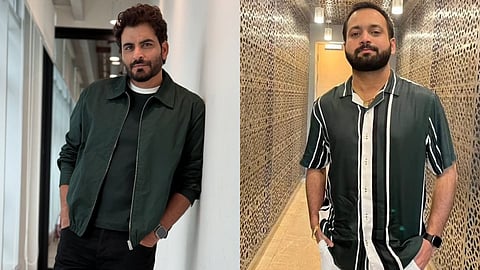

Manav Kaul returns home with his upcoming horror-thriller, Baramulla, which is named after the quaint town in Kashmir where he was born. The idea of home and belonging is deeply personal for Manav, which is evident in the lyrical, nostalgia-ridden prose of his 2023 autobiographical novel, Rooh. It is also the reason why Manav found it a strange coincidence when he was offered a role in the film by director Aditya Jambhale. The actor feels that he was meant to be part of Baramulla. “I have such stunning memories of Kashmir and Baramulla. I spent my entire childhood there,” Manav says, recalling the distinct smell of the air in the valley. “When I went back to the state after 27 years and took my first breath outside the airport at Srinagar, I knew, this is Kashmir,” he says.
Manav plays a sincere cop, DSP Ridwaan Shafi Sayyid, who is called to Baramulla to investigate the mysterious disappearance of a kid. Amidst signs of a supernatural entity haunting the town, Ridwaan finds himself entangled in the valley’s socio-political unrest and long-buried secrets. Playing Ridwaan was exciting for Manav as he loved donning the uniform. He also underwent physical training to match the vision of Ridwaan that the makers had in mind. “I have never done a film where I had to train for two months,” says Manav, as he also talks about the shoot, which took place in December, during the harsh winters of Kashmir. “It was quite tough but also extremely joyous,” he says.
The initial idea of the film was discussed by producer Aditya Dhar with Jambhale after observing the grey evenings in Kashmir. “There is nothing black or white about it. Everything is atmospheric,” says Jambhale. “That’s how Aditya Dhar came up with the idea of making a horror film in the setting.” He says that they wanted to make a genre-bending film. “We wanted to try and invent a new genre where it is not just a horror film. It is a supernatural, thriller, action, horror film,” he says. Even the filmmaker’s debut film, Article 370 (also backed by Dhar), was set in the valley and told a contentious, fictional story of what led to the abrogation of the state’s special status while operating like a slick-actioner. In doing so, however, there lies a risk of simplifying the complex geo-politics of the state. Jambhale doesn’t feel so. “We saw in Article 370 that politics overrides everything else, as there are many things at stake. But I feel, Baramulla is more about the humans than the politics,” he reasons.
A director’s sensibility becomes paramount while setting their story in a conflicted region like Kashmir. Barring a few exceptions, the valley has often just been romanticised in mainstream films as a ‘heaven on earth’ or just plainly demonised as a hub of militancy. In such a case, how does Jambhale think of portraying Kashmir? “It is important not to make the film as an outsider,” he says. “It won’t have depth if my references are from other films or what is being said about Kashmir in the media. Rather, it is important for the entire crew to feel Kashmir as an insider. All perceptions go away when we speak to people and get to know their perspective,” says Jambhale.
It was the film’s “multi-layered conflict” and “innovative genre-blend” that enticed Manav when he read the script. Juggling between being a novelist, director, playwright, and poet, Manav appears in lesser films as an actor. He says that he often gets bored with doing just one thing. “If I miss writing, I write a lot. If I write continuously for 2 to 3 months, I miss acting,” he says.
Manav believes that each artistic form he engages with leaves its imprint on his work. “I read a lot, that’s how I travel better. And because I travel better, I act and direct a little interestingly,” says Manav. “I can’t just sit in a coffee shop, do nothing, and expect to create a great novel one day. It is impossible. You have to do a lot of things to create a small thing.” It is also his practice in other art forms that allows Manav to be choosier with his films. “If I don’t act, I might travel or write a novel or a play or direct a film. So, the project should be worth the time that I am spending on it, as I have so many other things to do,” he says and concludes, “I have no compulsion to do a lot of work and be part of every film. I just want to live an entertaining life for myself and leave.”